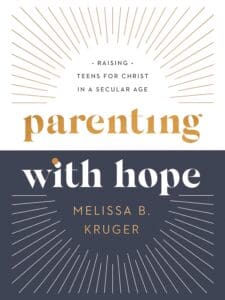
Different Citizenship
 Excerpt Taken from Parenting with Hope: Raising Teens for Christ in a Secular Age by Melissa B. Kruger
Excerpt Taken from Parenting with Hope: Raising Teens for Christ in a Secular Age by Melissa B. Kruger
As Christians, not only do we have different affections, we have a completely different citizenship. When I lived overseas, I felt the impact of my “differentness” every day, especially while teaching high school. My Scottish students were quick to point out that it was a rubbish can, not a trash can; a tap, not a faucet; a loo, not a bathroom; and (to my deep confusion as a math teacher) that the letter z was pronounced zed, not zee. I spoke differently, I dressed differently, and I cooked differently. Even though we shared a similar language, we came from different cultural contexts, and I felt those distinctions on a daily basis.
Living overseas helped me to appreciate, in a new way, what it meant to live in one country as a citizen of another country. People were welcoming and kind, but I didn’t belong in the same way. I was always a bit different. I missed family. I missed certain foods. I missed driving on the right side of the road. Every day, I knew I wasn’t home.
As a parent, it’s good to consider: How does our family look different from the other families around us? What is our true citizenship? Paul encouraged the Philippians with these words:
Brothers, join in imitating me, and keep your eyes on those who walk according to the example you have in us. For many, of whom I have often told you and now tell you even with tears, walk as enemies of the cross of Christ. Their end is destruction, their god is their belly, and they glory in their shame, with minds set on earthly things. But our citizenship is in heaven, and from it we await a Savior, the Lord Jesus Christ, who will transform our lowly body to be like his glorious body, by the power that enables him even to subject all things to himself (Philippians 3:17-21, emphasis added).
Paul didn’t simply tell the Philippians how to live, he served as an example for them to follow. He asked them to imitate the radical way he was living—as a citizen of heaven. While others were fixed on earthly desires, he was fixed on heavenly realities.
When your teen looks at your life, do they see you living differently from the world around you? How do they see you using your time, talents, and treasure? What type of friends do they see you prioritizing? How would they evaluate your screen time or your social interactions with others? If our minds are fixed on earthly things, we can rest assured that our kids will do the same.
One of my daughters and I had a conversation recently about how different we both feel from others around us. I could sympathize with her and share examples from my own life when my faith has meant I couldn’t go along with what other people are doing. We talked about what it meant to be strangers and aliens, and that “not fitting in” was actually a good sign, not a bad one. It doesn’t mean we’re trying to offend others, but rather, our Christian beliefs often set us at odds with others around us, even if we hold those beliefs with graciousness and kindness.
Our kids need our guidance, but they also need our example. They need to know we’re in the trenches with them, living as citizens of heaven in the midst of our earthly sojourn. Seeing us live purposefully will show our teens how to respond when they face challenges or opposition because of their faith. It will also help them understand how to process disappointments and difficult circumstances. I’ve told my kids to view life here as if they were on a journey. When you’re traveling, you don’t expect that everything will go according to plan. You know there will be delays. You expect to be worn out and tired. You won’t always be comfortable. You may miss friends and opportunities. These are all part of the journey.
Our overinflated expectations of this life can greatly impact our ability to enjoy it. If this life is all we are hoping in, then it makes sense for us to anxiously try to create the perfect life for our kids. However, if we believe a new home is coming, we can trust God with the imperfections because we know we’re just passing through. That relieves the pressure, doesn’t it? A new home is coming, a new day will dawn—that’s what we’re teaching our kids. Wait for it. Hope in it. Walk in a manner worthy of it.
When we lived overseas, I learned to drive on the opposite side of the road. I also learned a thing or two about roundabouts. There are various rules about how to enter a roundabout and which lane is the proper one to be in depending upon which direction you want to go. Let’s just say I learned these rules experientially (after being “taught” by the beeps of angry drivers).
Different countries have different rules. As God’s people, we should expect to have different rules than the non-Christian parents around us. Here’s the thing: Just because “all the other parents are doing it” doesn’t mean you have to. And, most likely, all the other parents aren’t letting their kids have a smartphone, stay out until 2:00 a.m., or drink alcohol on the weekends. It’s okay for you to set the rules in your home.
Peter urged his readers, “Beloved, I urge you as sojourners and exiles to abstain from the passions of the flesh, which wage war against your soul. Keep your conduct among the Gentiles honorable, so that when they speak against you as evildoers, they may see your good deeds and glorify God on the day of visitation” (1 Peter 2:11-12).
Our goal for our kids isn’t just to keep them out of trouble with the police (although some days that might seem like the best we can do). We want their conduct to be honorable, full of good deeds. We want them to be a friend who spurs others on in the faith. The rules of our homes shouldn’t just seek to prevent misbehavior, they should seek to encourage behaviors that bless others.
We want our teens to be comfortable living according to a different set of rules. The world will tell them to have “safe sex,” while we will tell them “flee from sexual immorality” (1 Corinthians 6:18). The world will tell them to “do what makes you feel good,” while we will tell them to “turn away from evil and do good” (1 Peter 3:11). The world will say, “Associate with influential people,” while we will tell them, “Associate with the lowly” (Romans 12:16).
As we set expectations with our teens, it’s important to have open conversations, to read the Bible together, and to help them understand why we’re making the decisions we’re making. It’s not disrespectful for a teen to ask, “Why?”—that’s actually a good question to ask.
Teens may be skeptical or distrustful, wondering if the Bible is an ancient book with rules that don’t fit in the modern world. If we want our teens to believe the Bible offers timeless wisdom for every generation, they need both our words and our example. Hypocrisy on our part will quickly undermine any rules we attempt to enforce in their lives.
We patiently teach the why behind our rules so that our teens can learn how to make good decisions for themselves. We also want to clearly communicate the reasons our rules are different than the rules of others. We’ve got a different citizenship, so we want them to learn to live by a different set of values.
…
Parenting with Hope. Copyright © 2024 Melissa B. Kruger. Published by Harvest House Publishers, Eugene, Oregon 97408. www.harvesthousepublishers.com
Order your copy of Parenting with Hope: Raising Teens for Christ in a Secular Age by Melissa B. Kruger
Trending Now
Sign up today for your Inspiration Today Daily Newsletter
Supercharge your faith and ignite your spirit. Find hope in God’s word. Receive your Inspiration Today newsletter now!
Melissa B. Kruger
Melissa B. Kruger serves as Vice President of Discipleship Programming at The Gospel Coalition. She regularly teaches women in her community and speaks at conferences around the country. Her latest book is Parenting with Hope: Raising Teens for Christ in a Secular Age. She is the wife of Michael J. Kruger, president and professor of New Testament at Reformed Theological Seminary-Charlotte. Together they have three young adult children. Learn more at melissabkruger.com
Related Articles
February 13, 2026
How to Find Joy in the Midst of Sorrow
Sorrow has a way of arriving uninvited—and staying longer than we expect. Loss reshapes our lives,…
January 30, 2026
What’s Happening to Your Family?
Families around the world are facing challenges that feel heavy, confusing, and unfamiliar. This…
January 14, 2026
How to Build a Stronger Marriage
When the same arguments keep resurfacing and distance quietly grows, it’s easy to feel stuck. If…
August 23, 2025
If God Is a Loving God, Why Is There So Much Pain in This Life?
Why is there so much pain in this life? This heartfelt article wrestles with that question through…
Next Steps To Strengthen Your Walk
Inspiration Today Newsletter
Supercharge your faith and ignite your spirit. Find hope in God’s word. Receive your Inspiration Today newsletter now!
Christian Articles
Find articles to strengthen your walk and grow your faith. We have a wide range of topics and authors for you.
Submit A Prayer Request
We are here for you. Simply click on the button below to reach us by form, email or phone. Together we will lift our hearts and voices with you in prayer.





